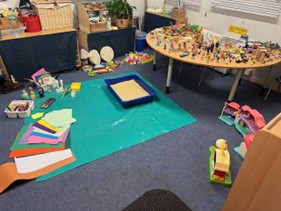Our Well-being Offer

Play Therapy
Play therapy provides children with a safe, creative space to express their feelings and work through emotional challenges using play-based techniques. It helps children develop coping strategies and emotional resilience.
Play therapy is a therapeutic approach that uses play and art to help children express their feelings when discussing emotions is challenging. It creates a safe space for children to explore their emotions through engaging activities like painting and role-play.
This method enables children to articulate complex feelings and work through emotional difficulties in a comfortable environment. Over time, they develop coping strategies and enhance their emotional resilience, making play therapy a vital tool for fostering emotional well-being in young learners.


Art Therapy
Art therapy allows children to explore and express their emotions through creative activities, supporting their emotional development and helping them process difficult feelings in a non-verbal way.

Dare to Differ – Mentoring Service
The "Dare to Differ" mentoring service offers one-on-one support to children, empowering them to build confidence, develop social skills, and manage challenges with the guidance of a dedicated mentor.

Thrive 1:1/Small Groups
Thrive 1:1 and small group sessions provide tailored support to children, focusing on emotional well-being, building resilience, and helping them develop skills for managing their feelings and relationships.


ELSA (Emotional Literacy Support Assistant)
ELSA offers targeted emotional support to children, helping them to better understand and manage their emotions, improve social skills, and cope with challenges both in and outside of school.

Spurgeons
Spurgeons offers specialist support for children and families, providing practical assistance and therapeutic interventions to improve wellbeing and strengthen family relationships.

Emotional Wellbeing Team
The Emotional Wellbeing Team is made up of trained professionals, including Emotional Wellbeing Practitioners and Mental Health Support Workers, who work directly with children, families, and school staff. Their role is to provide early help for parents of students who may be experiencing emotional difficulties such as anxiety, low mood, or challenges with emotional regulation.





